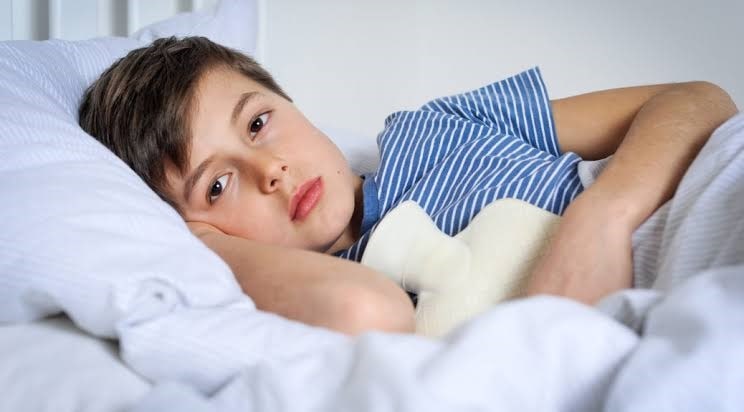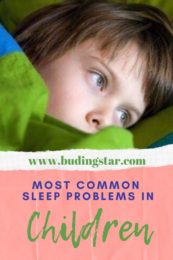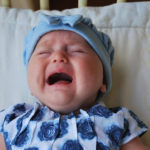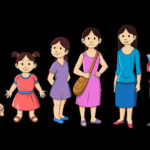More than 50% of children experience sleep-related problems. Identifying these sleep issues can resolve this condition and prevent some negative consequences. According to many doctors, sleep disorder is common among children and infants. Some negative consequences generally include daytime sleepiness, irritability, behavioral issues, difficulty to learn and a lot more. There is no doubt that sleep is one of the most crucial parts of our lives, especially when it comes to child care. Sleep disorder among children is undesired but this may happen as a result of many issues like anxiety, depression or even complex health condition.
Different types of sleep issues in Children:
- Sleep onset difficulties
- Limit setting sleep disorder
- Inadequate sleep hygiene
- Insufficient sleep syndrome
- Snoring and obstructive sleep apnea
- Sleepwalking
- Night terrors
- Nightmares
- Rhythmic movement disorder like headbanging
In this article, we are about to discuss the most common Sleep Problems in Children.
Most Common Sleep Problems in Children:
Childhood insomnia:
Insomnia or sleeplessness is a disturbed sleep cycle that involves difficulty in waking up in the early morning. In children, insomnia may last as long as a few weeks. This condition can invite other critical health conditions like stress, pain or ill mental health. So if you as a parent want to elevate this condition, then you may try to identify the exact stress reason that is making your child tensed. It can be very difficult to understand the stress factors of a child as that maybe the pressure of some additional homework, the problem with school friends or trying to adjust to a new city or locality. Every child must maintain a healthy lifestyle and must have a regular bedtime routine that lets them relax. If you find insomnia still continuing then you know it’s time to consult a doctor.
Delayed sleep:
Delayed sleep syndrome is also popular as sleepy teen syndrome that includes hampering the normal 24-hour sleep routine. Children suffering from this syndrome are unable to sleep in their bedtime and finally, fall asleep two to three hours late. This, in turn, results in waking up late in the morning.
Hypersomnia:
In this syndrome, child is excessively addicted to daytime sleep. They feel so sleepy in the morning that it can result in narcolepsy which is a neurological condition that causes frequent daytime sleepiness, lack of muscle control and even hallucinations. Other than this, delayed sleep phase syndrome or obstructive sleep apnea may also cause hypersomnia. However, any child suffering from Hypersomnia needs a proper diagnosis with the best treatment procedure.
Parasomnias:
Parasomnia is another medical condition that includes some undesirable physical events or experiences that are common in young children. This condition may include situations like rapid eye movement (REM), non-rapid eye movement. Some of the most common parasomnia symptoms include sleepwalking, waking up in a very confused state, sleep terrors where children get very scared and get up in the morning. Usually, in this phase, your child can experience intense nightmares and some children may also lack the ability to move the body, head or even limb during this particular period. Consulting to a doctor is a must and what is even more important is for the parent to stay with them in such a difficult time.
Movement disorder:
This is a neurological condition that involves the restless movement of the legs, periodic movement of the limbs. A child experiences some uneasiness in their legs or limbs and experiences a deep desire to move them relentlessly. This condition may occur at night while they are in deep sleep and their sleep quality may be hampered.
Obstructive sleep apnea:
Obstructive sleep apnea is another most common condition among children. This may include nigh time snoring with periodic pauses, feeling chocked, gasping and acute disruption in sleep. However, it has often been seen that children who snore might have a large tonsil or are suffering from obesity or from some allergic diseases. Sleep apnea is also associated with abnormal development, bedwetting, behavioral issue, late learning, daytime sleepiness or even hyperactivity. Some of the most popular treatments for obstructive sleep apnea are weight loss, managing allergies, using nasal drops, taking antibiotics and the last resort is operating tonsil.
Behavioral and Mental health disorders:
Mental and health disorder occurs to children who are suffering from autism spectrum disorder and attention deficit hyperactivity disorder. It may also occur as a result of some mental health issues like anxiety, mood fluctuations or even insomnia. The only cure for this condition is following the doctor’s prescription. However, the medications used to treat this condition may affect overall sleep quality.
Sleep experts suggest that parents must pay more attention to their children’s sleep routines. Every elementary-aged child requires a minimum of 10 to 11 hours of sleep each night and preschool-aged children must sleep for about 11 to 13 hours at night. Parents must consult doctors if they find their child sleepwalking or encountering some difficulty while sleeping.
- The Most Common Sleep Problems in Children - December 3, 2019
- How to Deal with Bad Habits in Children - October 31, 2019















